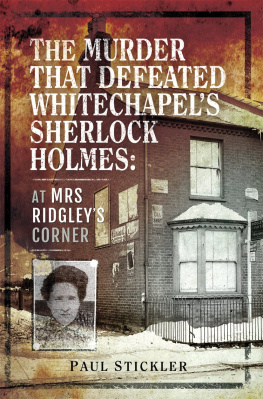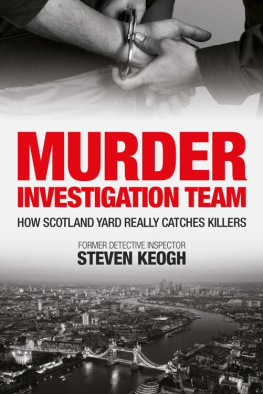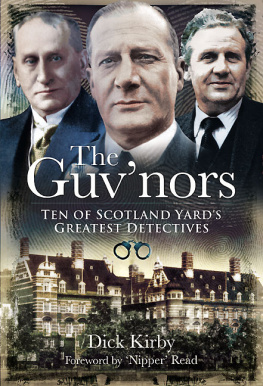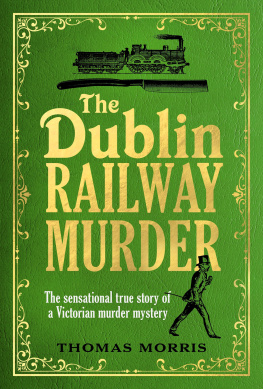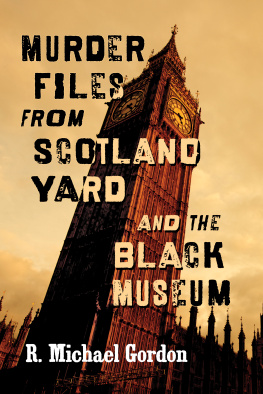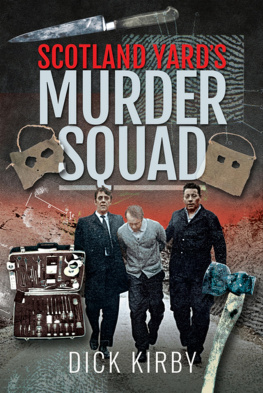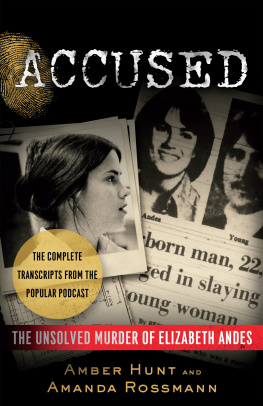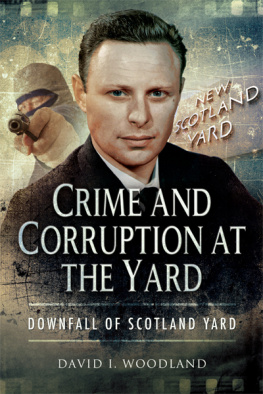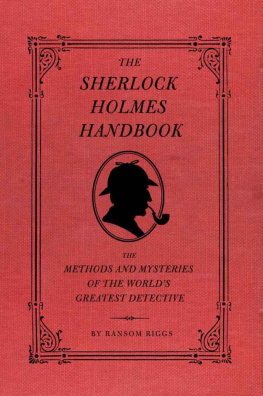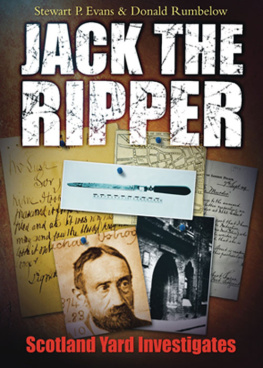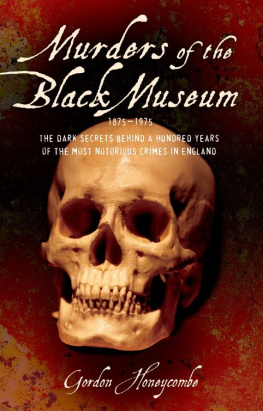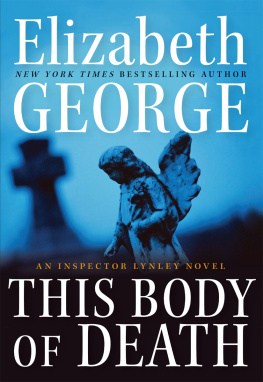Pagebreaks of the print version

The Murder that Defeated Whitechapels Sherlock Holmes
For my children, Natalie, Hayley and Tom.
The Murder that Defeated Whitechapels Sherlock Holmes
At Mrs Ridgleys Corner
Paul Stickler
First published in Great Britain in 2017 by
PEN AND SWORD HISTORY
an imprint of
Pen and Sword Books Ltd
47 Church Street
Barnsley
South Yorkshire S70 2AS
Copyright Paul Stickler, 2018
ISBN 978 1 52673 385 6
eISBN 978 1 52673 386 3
Mobi ISBN 978 1 52673 387 0
The right of Paul Stickler to be identified as the author of this work has been asserted by him in accordance with the Copyright, Designs and Patents Act 1988.
A CIP record for this book is available from the British Library All rights reserved. No part of this book may be reproduced or transmitted in any form or by any means, electronic or mechanical including photocopying, recording or by any information storage and retrieval system, without permission from the Publisher in writing.
Pen & Sword Books Ltd incorporates the imprints of Pen & Sword Archaeology, Atlas, Aviation, Battleground, Discovery, Family History, History, Maritime, Military, Naval, Politics, Railways, Select, Social History, Transport, True Crime, Claymore Press, Frontline Books, Leo Cooper, Praetorian Press, Remember When, Seaforth Publishing and Wharncliffe.
For a complete list of Pen and Sword titles please contact
Pen and Sword Books Limited
47 Church Street, Barnsley, South Yorkshire, S70 2AS, England
E-mail:
Website: www.pen-and-sword.co.uk
Acknowledgements
Writing and researching for this book has been an immensely enjoyable journey and there a few people I would like to thank. First of all to the body of professional archivists who always seem to know where to find helpful information, particularly Michael Lynch, archivist at Kerry Library, Tralee, who was tremendously helpful in locating documents about Listowel and John Healys family and Stefan Dickers at the Bishopsgate Institute in London who pointed me in the right direction of valuable information regarding Fred Wensley. Equal thanks go to Nick Connell at the Hertfordshire Archives and Local Studies, Hertfordshire County Council and to the Hertfordshire Constabulary Historical Society for the assistance they provided. I owe a deal of gratitude to Derek Stevens, Curator and Secretary of the Hampshire Constabulary History Society who stumbled across original and exciting material and brought it to my attention and to Dr Clifford Williams of the same Society for pointing me in the right direction. I extend similar thanks to Marc Thompson for his invaluable help in researching military records. For reading my manuscript and providing me with extremely helpful feedback, I would like to thank Mark Jones, Colin Smith, Natalia Sabadas and Andy Williams. Finally, for providing encouragement and instilling in me a genuine belief that this project could be done I want to extend a special thank you to Dan Clacher, Moira Anderson and again, Natalia Sabadas. Without each of you, I may well have given up.
Paul Stickler,
September 2017
Introduction
Murder narratives are relatively commonplace and occupy a prominent position in the public imagination. The enduring fascination with peoples behaviour seems never-ending, particularly when it involves the ultimate act of violence and the quest to find out who was responsible. Many cases will remain in the memories of people for considerable time such has been the amount of attention that has been paid to quite extraodinary events in the past.
Every now and again, though, an unwritten story, hidden away in dusty archives, rises to the surface which has received no attention, no analysis and involving someone who has been long forgotten. At Mrs Ridgleys Corner is such a case, a victim buried in an unmarked grave, her plight unknown and consigned to history. Her story needs to be told for it has an important contribution to make to understand a piece of history, to throw light on rural policing immediately after the First World War and, importantly, ensure she is not forgotten.
I have chosen to adopt a different approach to the conventional method of analysis, preferring instead to examine the detail through the eyes and emotions of the characters involved, as if the reader was there listening to their thoughts, and without a narrative which has the benefit of knowing what is yet to come. Such an approach gives the reader a greater understanding of not only what happened, but why. The decisions taken by the police, by neighbours and other key actors are seen through an untainted lens, and in the order it happened.
There are no assumptions made about any of the characters involved, no unnecessary dramatisation, but rather it draws on the original material, documents and photographs, which exposes sufficent drama in itself.
It is, ultimately, an account which would, I hope, address the frustrations of those who were involved and if it was of course possible, allow the victim lying in her grave, to rest a little more in peace.
Where a person of sound memory and discretion unlawfully killeth any reasonable creature in being and under the Kings Peace with malice aforethought either express or implied he shall be guilty of murder. (Edward Coke 1552-1634)
I, ______, do swear that I will well and truly serve our Lord The King in the office of Constable for the County of Hertfordshire, without favour or affection, malice or ill-will: and that I will to the best of my power cause the peace to be kept and preserved, and prevent all offences against the persons and properties of His Majestys subjects: and that while I continue to hold the said office I will to the best of my skill and knowledge discharge all the duties thereof faithfully according to law. So help me God. (Police Oath of Office)
Chapter 1
Death on the Corner
Hertfordshire, Saturday, 25 January 1919
Unusually, the front door was open. A dim light shone from inside. People who passed the grocers shop on the corner of Garden Row and Nightingale Road in the Hertfordshire town of Hitchin thought it odd but ignored it. Saturday, 25 January was a bitterly cold night, snow thick on the ground, sleet blown into the faces of the few who braved the weather. It wasnt the night to hang around; a night to be at home in front of the fire. Everyone knew that at nine oclock Mrs Ridgley routinely closed her shop, locked the front door and extinguished the paraffin lamp in her converted front room, but perhaps she was busy dealing with a customer. Ten minutes later, the front door was closed, its blind still up and the lamp still emitted its faint glow. Unusual, but those who saw it were more concerned about getting home.
The following morning, Sunday, Gertrude Day edged carefully along Garden Row having twice already slipped up on the fresh snow that had fallen overnight. As she approached the junction, taking her alongside the rear of Mrs Ridgleys shop, she saw the back door open and subconsciously expected to see the 54-year-old woman either emerge or to see her somewhere in the back garden, but she saw only the small, cluttered yard, though barely visible through the six feet of untidy hedgerow. maintaining her footing on the slippery surface. As she turned the corner and passed the front door of the shop, nothing caught her attention. It was, after all, a Sunday and everything was closed.

